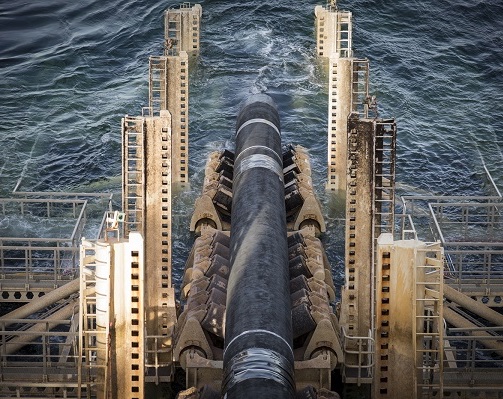Nord Stream Gas Capacity to Europe Constrained by Repair Delays
(Reuters) — The capacity of Gazprom's Nord Stream 1 pipeline to supply gas to Europe is partly constrained as sanctions make it impossible for equipment supplier Siemens Energy to return a turbine being maintained in Canada, the companies said.
Gazprom said on Tuesday it has curbed supplies via the Nord Stream 1 undersea pipeline to Germany to up to 100 million cubic meters (mcm) per day, down from 167 mcm, citing the delayed return of equipment that had been sent for repair.
This limits Russian gas supplies via another important route to Europe at a time when Germany, the region's biggest economy, questions Moscow's reliability as an energy provider, prompting efforts to look for alternative sources.
Gazprom no longer exports gas westwards through Poland via the Yamal-Europe pipeline following Russian sanctions against EuRoPol Gaz, which owns the Polish section. Flows via Yamal-Europe continue eastwards from Germany to Poland.
"Due to the delayed return of gas compressor units from repair by Siemens ... and technical engines' malfunctions, only three gas compressor units can currently be used at the Portovaya compression station," Gazprom said.
Siemens Energy, which was spun off from former parent Siemens in 2020, said in a statement that it supplied so-called aeroderivative gas turbines for a compressor station for Nord Stream 1 in 2009.
These were manufactured in Canada and needed to be regularly sent back for maintenance, Siemens Energy said, adding one of the turbines was currently being overhauled in Montreal.
"Due to the sanctions imposed by Canada, it is currently impossible for Siemens Energy to deliver overhauled gas turbines to the customer. Against this background we have informed the Canadian and German governments and are working on a viable solution," the company said.
Separately last month, Ukraine suspended Russian gas flows via one of the two transit points to Europe, cutting off a third of the Russian gas which is piped to Europe through Ukraine.
Physical flows through the Nord Stream 1 pipeline fell on Tuesday to around 41 million kilowatt hours (kWh) per hour from 1200 GMT, down from about 52 million kWh up until then, data from the pipeline operator available around 1528 GMT showed.
Related News
Related News

- Keystone Oil Pipeline Resumes Operations After Temporary Shutdown
- Biden Administration Buys Oil for Emergency Reserve Above Target Price
- Freeport LNG Plant Runs Near Zero Consumption for Fifth Day
- Enbridge to Invest $500 Million in Pipeline Assets, Including Expansion of 850-Mile Gray Oak Pipeline
- Williams Delays Louisiana Pipeline Project Amid Dispute with Competitor Energy Transfer
- Evacuation Technologies to Reduce Methane Releases During Pigging
- Editor’s Notebook: Nord Stream’s $20 Billion Question
- Enbridge Receives Approval to Begin Service on Louisiana Venice Gas Pipeline Project
- Russian LNG Unfazed By U.S. Sanctions
- Biden Administration Buys Oil for Emergency Reserve Above Target Price





Comments